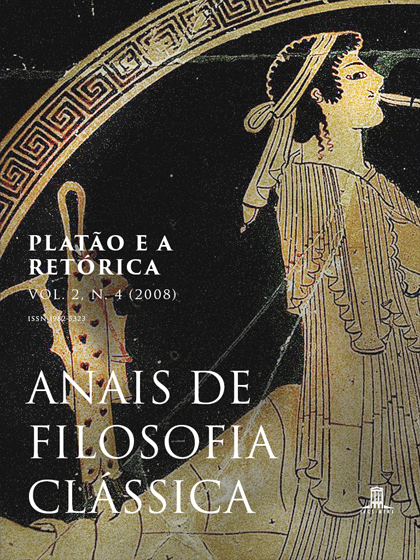Poesia e filosofia em Platão: a noção de entusiasmo poético
DOI:
https://doi.org/10.47661/afcl.v2i4.17001Palavras-chave:
Platão. Íon. poética. entusiasmo. mímesis. epistéme. lógos.Resumo
Resumo:
Sabemos que Platão concede ao rapsodo (o intérprete da poesia homérica) uma condição passível, ao mesmo tempo, de crítica e elogio. De elogio, na medida em que o rapsodo deve ser considerado um homem especial, tomado por uma força entusiástica que o conduz à elevação necessária à atividade poético-interpretativa. De crítica, na medida em que a sua interpretação explicativa do poema (a sua dialégesthai) não segue os critérios demonstráveis da dialética, ou seja, que a atividade hermenêutica do rapsodo não pode ser tomada nem como arte (téchne) nem como conhecimento (epistéme). O que tento revelar nesse artigo é o quanto Platão importa da atividade inspirada do poeta para a sua própria filosofia. Afinal, para Platão o filósofo é também um homem inspirado (não pelas Musas, mas por Eros). Como nos diz J.-F. Mattéi, a filosofia é então a verdadeira obra poética que, longe de abolir a arte, a eleva à altura da verdade que, como a linguagem do poeta ou a figura do pintor, não abandona jamais a esfera do icônico.
Palavras-chave: Platão. Íon. poética. entusiasmo. mímesis. epistéme. lógos.
Abstract:
We know that Plato figures in both criticism and praise for the rhapsodist (the interpreter of homeric poetry). On the one hand, the rhapsodist is eligible for praise, since he was a special man, possessing an enthusiastic force that enables him to engage in highly poetic-interpretative activity. On the other hand, he is eligible for criticism, since his explanatory interpretation of the poem (his dialégesthai) does not act in accordance with the attested criteria of the dialectics, that is, his hermeneutic activity cannot be seen either as art (téchne) or as knowledge (epistéme). What I attempt to reveal in this article is how much Plato imports from inspired activity of the poet to his own philosophy. All in all, for Plato the philosopher is also an inspired man (not by the Muses, but by Eros). According to J.-F. Mattéi, philosophy is the actual poetic work, which, far from abolishing art, elevates it to the value of truth, and in the same way as the poet's language or the painter's picture, does never abandon the iconic sphere.
Keywords: Plato. Ion. poetic. enthusiasm. mímesis. epistéme. lógos.


